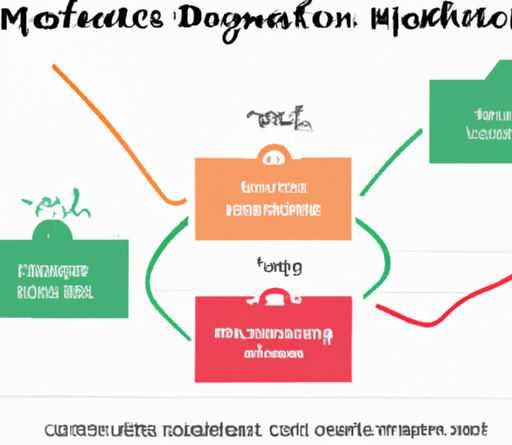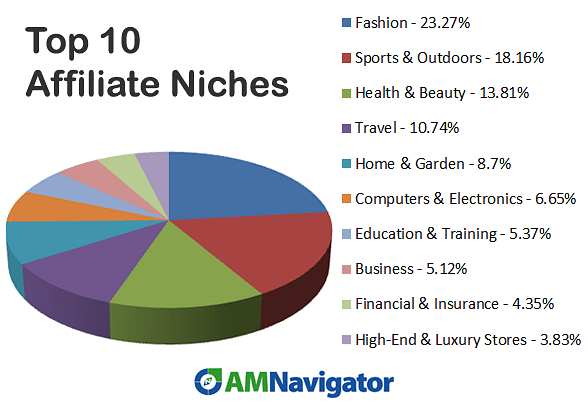
In the rapidly evolving digital landscape, affiliate marketing has emerged as a viable and lucrative way to generate passive income. In this article, we will explore the intricacies of this online business model, focusing specifically on how to make money through affiliate marketing in specialized market segments, commonly referred to as niches. By understanding the unique advantages and strategies associated with niche affiliate marketing, you can unlock the untapped potential of this thriving industry and pave your path towards financial success.
Choosing a Profitable Niche
When embarking on your affiliate marketing journey, the first step is to choose a profitable niche. This involves identifying your interests and expertise, researching market demand and competition, and evaluating profit potential.
Identifying your interests and expertise
Selecting a niche that aligns with your interests and expertise can greatly enhance your chances of success. Consider the topics that captivate your attention and the industries where you have knowledge or experience. By choosing a niche that you are passionate about, you will be more motivated to create quality content and engage with your audience.
Researching market demand and competition
Before settling on a niche, it is crucial to research the market demand and competition. Look for niches that have a viable audience size and are not oversaturated with competitors. Tools like keyword research and market analysis can help you identify the popularity and potential profitability of a niche.
Evaluating profit potential
While you may have an interest in a particular niche, it is essential to assess its profit potential. Look for niches that have products or services with high commission rates. Additionally, consider the longevity and growth potential of the niche. A niche that is expected to have sustainable demand in the long run will provide more opportunities for profitability.
Building a Website or Blog
Once you have chosen a profitable niche, the next step is to build a website or blog to establish your online presence. This involves selecting a domain name and hosting service, setting up a user-friendly website with a responsive design, and optimizing website performance and speed.
Selecting a domain name and hosting service
Choose a domain name that is relevant to your niche and easy to remember. Consider registering a domain that includes keywords related to your niche to improve search engine optimization (SEO). Additionally, select a reliable hosting service that ensures your website is accessible and performs well.
Setting up a user-friendly website with a responsive design
Your website should provide a seamless user experience and be visually appealing. Select a user-friendly content management system (CMS) such as WordPress to easily create and manage your website. Use a responsive design that adapts to different devices and screen sizes, ensuring your website looks great on desktops, tablets, and mobile devices.
Optimizing website performance and speed
Website performance and speed are critical factors for user satisfaction and search engine rankings. Optimize your website by compressing images, minifying CSS and JavaScript files, and utilizing caching techniques. Additionally, choose a reliable hosting provider that offers fast loading speeds and minimal downtime.
Selecting the Right Affiliate Program
To monetize your website or blog, it is important to select the right affiliate program. This involves understanding different types of affiliate programs, researching and comparing various programs, and considering commission rates and payment methods.
Understanding different types of affiliate programs
There are various types of affiliate programs available, including pay-per-sale, pay-per-lead, and pay-per-click. Pay-per-sale programs offer a commission for each sale generated through your affiliate links. Pay-per-lead programs compensate you for every lead or sign-up you generate. Pay-per-click programs reward you for each click on your affiliate links, regardless of whether a sale or sign-up is made.
Researching and comparing affiliate programs
Thoroughly research and compare different affiliate programs to find ones that align with your niche and offer competitive commission rates. Consider the reputation and track record of the affiliate program, as well as the quality and range of products or services they offer.
Considering commission rates and payment methods
When evaluating affiliate programs, consider the commission rates they offer. Look for programs that provide higher commission rates for products that are popular or have high-profit margins. Additionally, consider the ease of receiving payments and choose programs that offer convenient payment methods such as PayPal or direct bank transfers.
Identifying Profitable Affiliate Products
To maximize your affiliate marketing earnings, it is essential to identify profitable affiliate products within your chosen niche. This involves researching popular products, evaluating their quality and customer reviews, and looking for products with high commission rates.
Researching popular products in your niche
Conduct thorough research on popular products within your niche. Look for products that have a high demand and are frequently searched for by your target audience. Consider using keyword research tools to identify products with the highest search volume.
Evaluating product quality and customer reviews
Choose affiliate products that have a good reputation for quality. Read customer reviews and ratings to understand the experiences of people who have purchased the products. Products with positive reviews and ratings are more likely to convert into sales.
Looking for products with high commission rates
While product quality is important, it is also essential to consider the commission rates offered. Look for products that provide a high percentage commission or a fixed dollar amount per sale. Balance the commission rates with the popularity and demand for the product to ensure profitability.
Creating High-Quality Content
Content creation plays a vital role in attracting and engaging your target audience. To create high-quality content, you should understand the importance of valuable content, identify the needs and interests of your target audience, and develop engaging and informative articles, reviews, and guides.
Understanding the importance of valuable content
Valuable content is the cornerstone of a successful affiliate marketing strategy. It not only attracts and engages your target audience but also establishes you as a trusted authority in your niche. High-quality content that provides valuable information, solves problems, or offers insights will not only keep your audience coming back but also increase the chances of them making a purchase through your affiliate links.
Identifying the needs and interests of your target audience
To create content that resonates with your target audience, you must first understand their needs and interests. Use market research, surveys, and social media insights to gain insights into their preferences, pain points, and desires. By addressing these needs and interests through your content, you can establish a connection with your audience and build trust.
Developing engaging and informative articles, reviews, and guides
When creating content, focus on providing valuable information and actionable insights. Develop engaging articles, reviews, and guides that educate and entertain your audience. Use a mix of text, images, and multimedia elements to make your content visually appealing and easy to consume. Incorporate relevant keywords in your content to enhance search engine visibility.
Implementing Effective SEO Strategies
Implementing effective SEO (Search Engine Optimization) strategies is crucial to drive organic traffic to your website and increase visibility in search engine results. This involves keyword research and analysis, on-page optimization techniques, and building high-quality backlinks.
Keyword research and analysis
Conduct thorough keyword research to identify the terms and phrases your target audience uses when searching for information related to your niche. Use keyword research tools to identify high-volume keywords with low competition. Incorporate these keywords naturally throughout your website content, including page titles, headings, and meta descriptions.
On-page optimization techniques
On-page optimization refers to optimizing the content and structure of your website pages to improve search engine rankings. Ensure your website is properly structured with relevant headings, subheadings, and paragraphs. Optimize your titles, meta descriptions, and image alt tags with appropriate keywords. Enhance the user experience by ensuring fast loading times and mobile responsiveness.
Building high-quality backlinks
Backlinks, or incoming links from other websites, are essential for improving your website’s authority and search engine rankings. Focus on building high-quality backlinks from reputable and relevant websites within your niche. This can be achieved through guest posting, content partnerships, and engaging with influencers and industry experts in your niche.
Promoting Your Affiliate Products
Promoting your affiliate products effectively is crucial to generate sales and increase your affiliate marketing revenue. This involves leveraging social media marketing, developing an email marketing campaign, and participating in relevant online communities and forums.
Leveraging social media marketing
Social media platforms provide a valuable opportunity to promote your affiliate products and engage with your target audience. Create dedicated social media profiles for your affiliate marketing business and share valuable, engaging content that showcases the benefits of the products you promote. Use eye-catching visuals and include your affiliate links strategically within your posts and profiles.
Developing an email marketing campaign
Build an email list of subscribers who are interested in your niche and affiliate products. Develop an email marketing campaign that provides valuable content and recommendations related to your niche, while incorporating affiliate links strategically. Avoid excessive promotion and focus on building trust and providing value to your subscribers.
Participating in relevant online communities and forums
Engage with online communities and forums related to your niche to establish your authority and promote your affiliate products. Provide valuable insights, answer questions, and offer helpful recommendations within these communities. However, be mindful of community guidelines and avoid spamming or excessive self-promotion.
Tracking and Analyzing Performance
Tracking and analyzing the performance of your affiliate marketing efforts is crucial to identify areas for improvement and optimize your strategies. This involves setting up tracking tools and software, analyzing conversion rates and click-through rates, and making data-driven decisions to improve performance.
Setting up tracking tools and software
Utilize tracking tools and software to monitor and analyze the performance of your affiliate marketing campaigns. Implement conversion tracking to measure the number of sales or leads generated through your affiliate links. Use analytics tools, such as Google Analytics, to track website traffic, visitor behavior, and key performance indicators.
Analyzing conversion rates and click-through rates
Regularly analyze your conversion rates and click-through rates to assess the effectiveness of your affiliate marketing efforts. Identify the sources of high-converting traffic and optimize your strategies accordingly. Experiment with different calls-to-action, placements of affiliate links, and content formats to improve the click-through rates and ultimately drive more conversions.
Making data-driven decisions to improve performance
Use the insights gained from your tracking and analysis to make data-driven decisions. Identify the sources, campaigns, or content formats that are most effective in generating conversions. Allocate your time and resources to the strategies and channels that yield the best results. Continuously test and iterate on your strategies to optimize your performance.
Building a Strong Brand and Reputation
Building a strong brand and reputation in the affiliate marketing industry is essential for long-term success. This involves consistently providing valuable content and recommendations, maintaining transparency and honesty in your affiliate marketing efforts, and building relationships with your audience and fellow marketers.
Consistently providing valuable content and recommendations
Consistency is key when it comes to building a strong brand and reputation. Continuously create and share valuable content that educates, entertains, and solves problems for your target audience. Provide honest and unbiased recommendations for affiliate products, focusing on their benefits and how they can genuinely help your audience.
Maintaining transparency and honesty in your affiliate marketing efforts
Transparency and honesty are crucial for building trust with your audience. Clearly disclose your affiliate relationships and make it known that you may receive a commission for purchases made through your affiliate links. Avoid misleading or exaggerated claims about products and ensure that any endorsements or testimonials are genuine and reflect your honest opinion.
Building relationships with your audience and fellow marketers
Engage with your audience and foster relationships through various channels, such as email, social media, and comments on your website. Respond promptly to questions and feedback, and show genuine interest in your audience’s needs and concerns. Collaborate and network with fellow marketers and influencers in your niche to expand your reach and learn from their experiences.
Scaling Your Affiliate Marketing Business
To take your affiliate marketing business to the next level and increase your earnings, it is essential to scale your efforts. This involves automating processes and outsourcing tasks, expanding into multiple niches or sub-niches, and collaborating with other affiliate marketers or influencers.
Automating processes and outsourcing tasks
As your business grows, consider automating repetitive tasks and outsourcing non-core activities. Use email marketing automation tools to streamline your campaigns and customer interactions. Outsource tasks like content creation, graphic design, or website maintenance to free up your time for strategic activities.
Expanding into multiple niches or sub-niches
Once you have established success in one niche, consider expanding into complementary niches or sub-niches. This allows you to diversify your income streams and tap into new audiences. Ensure that the niches you expand into are aligned with your expertise and have sufficient demand and profitability potential.
Collaborating with other affiliate marketers or influencers
Collaboration with other affiliate marketers or influencers can greatly enhance your reach and credibility. Seek out opportunities for joint ventures, co-promotions, or affiliate partnerships. Partnering with influencers in your niche can expose your affiliate products to their followers and expand your audience.
In conclusion, becoming a profitable affiliate marketer requires careful planning and execution. By choosing a profitable niche, building a user-friendly website, selecting the right affiliate program, identifying profitable products, creating high-quality content, implementing effective SEO strategies, promoting your products strategically, tracking and analyzing performance, building a strong brand and reputation, and scaling your business, you can maximize your earning potential in the affiliate marketing industry. Stay focused, continuously learn and adapt, and embrace the opportunities that come your way.







